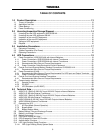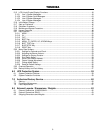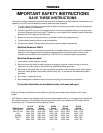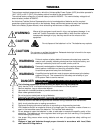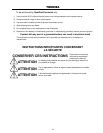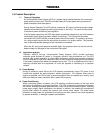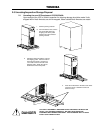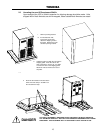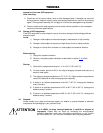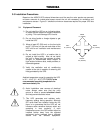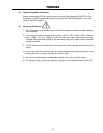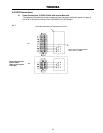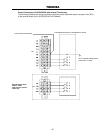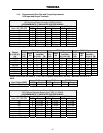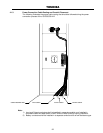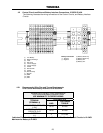
TOSHIBA
16
Inspection of the new UPS equipment
After Uncrating:
1) Check the unit for loose, broken, bent or other damaged parts. If damage has occurred
during shipment, keep all original crating and packing materials for return to the shipping
agent. The equipment warranty will not apply to units that are damaged during shipment.
2) Check to see that the rated capacity and the model number specified on the nameplate
conform to the order specifications.
2.4 Storage of UPS equipment
If the UPS equipment is to be subject to long or short-term storage, the following guidelines
should be used.
Avoid:
1) Storage in sites subject to extreme changes in temperature or high humidity.
2) Storage in sites subject to exposure of high levels of dust or metal particles.
3) Storage on inclined floor surfaces or in sites subject to excessive vibration.
Before storing:
1) Charge the system's batteries.
2) Perform a complete system shutdown as described in section 5.18
of this
manual.
Storing:
1) Store within a temperature range of - 4° to 104° F (-20° to 40° C).
2) For best results, store the UPS in the original shipping container and place on a
wood or metal pallet.
3) The optimum storage temperature is 70° F (21° C). Higher ambient temperatures
cause UPS batteries to need recharging more frequently.
4) If stored in an ambient temperature under 68° F (20° C), recharge the batteries
every 9 months.
5) If stored in an ambient temperature of 68° to 86° F (20° to 30° C), recharge the
batteries every 6 months.
6) If stored in an ambient temperature of 86° to 104° F (30° to 40° C), recharge the
batteries every 3 months.
2.5 Disposal
Please contact your state environmental agency for details on proper disposal of electrical
components and packaging in your particular area.
ATTENTION
It is ILLEGAL to dump lead-acid batteries in landfills or dispose of
improperly. Please help our Earth by contacting the environmental
protection agencies in your area, the battery manufacturer, or call Toshiba
toll-free at (800) 231-1412 for more information about recycling batteries.



